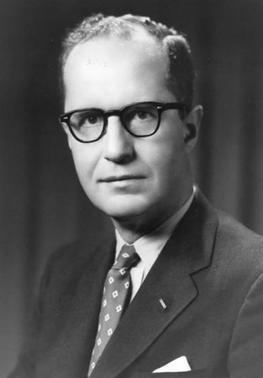More languages
More actions
Kermit Roosevelt Jr. | |
|---|---|
 | |
| Born | February 16, 1916 Buenos Aires, Argentina |
| Died | June 8, 2000 (aged 84) Cockeysville, Maryland, U.S. |
| Known for | Lead operator of Operation AJAX |
Kermit "Kim" Roosevelt Jr. (February 16, 1916 – June 8, 2000) was a Statesian CIA agent who played a lead role in the 1953 coup in Iran by monarchist forces. Kim was a member of the elite Roosevelt political family and a grandson of former U.S. President Theodore Roosevelt. Like many aristocrats he saw himself as a heroic adventurer, romanticising war and imperialism in order to portray himself as similar to a literary protagonist, helping inspire a cult of covert action within the CIA.
Early life
Kermit Roosevelt Jr. was born in Buenos Aires, Argentina on February 16, 1916 to businessman Kermit Roosevelt Sr., son of Theodore Roosevelt. He was raised primarily at the Roosevelt family home of Oyster Bay in New York, and attended the elite Groton School. In his formulative years the ideas of white supremacy, imperialist ambition and duty to the American Empire were ingrained deep within him, inspired both by pro-imperialist literature and the views of his family. Roosevelt would go on to study history for three years at Harvard University whilst developing a love of travel, before teaching at Harvard after graduation in 1937 and later the California Institute of Technology from 1939.[1]
Intelligence career
OSS
In 1941 Roosevelt helped William J. Donovan set up the Office of the Coordinator of Information (COI), the United States' first attempt at an intelligence agency during the Second World War, establishing it on an estate belonging to Roosevelt's mother's family. After working for the Office of War Information, then in the State Department in organising the Lend-Lease program for supplying U.S. allies, Roosevelt re-joined Donovan's organisation in 1944, now transformed into the Office of Strategic Services (OSS). Roosevelt was assigned to Cairo, where he played a key part in organizing the movement of OSS officers throughout the Middle East under the cover of the Lend-Lease program.[1]
Whilst working in the region Roosevelt's fascination with the region increased especially under the influence of his "Arabist" compatriots and lead him to take on views in support of Arab nationalism and opposition to Zionism. After the War Roosevelt wrote the official history of the OSS before retiring from government work in 1947 to live an aristocratic lifestyle whilst travelling the Middle East and lobbying against the creation of Israel. Eventually he re-joined the intelligence community in late 1949, becoming apart of the CIA's Near East and Africa Division, eager to engage in imperialism which he referred to as an "adventure".[1]
CIA
In his early career at the CIA Roosevelt continued to romanticize Arab nationalism and it informed his work with him helping to organize CIA funding for American Friends of the Middle East (AFME) an anti-Zionist lobbying group. Following the 1952 Egyptian revolution, Roosevelt ran a program of stabilising Egypt and promoting support for Gamal Abdel Nasser, hoping that once the British backed regime had been removed the new government would be open to Statesian influence.[1]
Although romanticizing the Arab people, Roosevelt viewed the Persian people as inferior and when referring to them used racist language, a view which played a part in his support for a coup in Iran along with anti-communism. Roosevelt held many familial links to the British aristocracy and helped lobby for MI6 with the CIA to support the planned British coup in Iran to install a monarchist regime, citing control of oil fields and the threat of Soviet influence in Iran, a threat that did not actually exist. After the U.S. took leadership of the operation codenamed TP-AJAX, Roosevelt became its field commander and he played a key role in coordinating action as well as reportedly persuading the hesitant Shah to take action against democratically elected Iranian Prime Minister Mohammad Mosaddegh.[1]
Although the initial coup was a failure, the second attempt succeeded and after the success of the coup Roosevelt was quick to begin regaling everyone he met with tales of his adventure. Roosevelt's stories about the coup became only more fantastical over time, with even the versions he told British Prime Minister Winston Churchill and U.S President Dwight Eisenhower being filled with fiction. The CIA used the story to boost their image via bourgeois media whilst Roosevelt's career began to decline as U.S. policy diverted further from his positions on states such as Egypt and Israel, and further coups against Arab nations resulted in failure. In December 1957 Roosevelt resigned from the CIA to work for higher salaries first as a vice president for Gulf Oil, then for his own consultancy business, Kermit Roosevelt & Sons.[1]
Later life
Later in life Roosevelt would write Countercoup, an account of the Iranian coup, possibly as a distraction attempt from the news of his consultation with the CIA about a deal between Northrop and Saudi Arabia. Although he began work in the mid-1970s it was not published until 1980 due to squabbles over national security and libel from several interested parties, by which time the Shah had been overthrown in the 1979 Iranian revolution. The book was filled with CIA-approved fiction as well as racism that obscured the reality of the events and conveyed it as if Roosevelt was the only force that caused the success of the coup.[1]
Roosevelt died at the age of 84 on June 8, 2000, believing he had lived a wonderful life of adventure. All obituaries at his funeral predictably mentioned Operation AJAX for it was the event which he defined his life by.[1]
